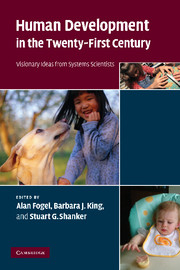Book contents
- Frontmatter
- Contents
- List of contributors
- Introduction: Why a dynamic systems approach to fostering human development?
- Part I Dynamic relationships between genetics and environments
- Part II The dynamic system of the child in the family
- Part III The dynamic system of the child in social and physical environment
- 10 The tempest: anthropology and human development
- 11 An anthropology of human development: what difference does it make?
- 12 The social child
- 13 Learning about human development from a study of educational failure
- 14 Dynamic views of education
- 15 Embodied communication in non-human animals
- 16 Children in the living world: why animals matter for children's development
- Part IV Dynamic systems approaches to mental health
- Part V Conclusions and outlook
- Index
- References
12 - The social child
Published online by Cambridge University Press: 22 September 2009
- Frontmatter
- Contents
- List of contributors
- Introduction: Why a dynamic systems approach to fostering human development?
- Part I Dynamic relationships between genetics and environments
- Part II The dynamic system of the child in the family
- Part III The dynamic system of the child in social and physical environment
- 10 The tempest: anthropology and human development
- 11 An anthropology of human development: what difference does it make?
- 12 The social child
- 13 Learning about human development from a study of educational failure
- 14 Dynamic views of education
- 15 Embodied communication in non-human animals
- 16 Children in the living world: why animals matter for children's development
- Part IV Dynamic systems approaches to mental health
- Part V Conclusions and outlook
- Index
- References
Summary
The theory of socialization
In every society, in every generation, children grow up to become knowledgeable members of the communities in which they live. Sociologists and anthropologists have classically described this process as one of socialization. The new-born child, they say, comes into the world as an entirely asocial being – equipped, to be sure, with certain innate response mechanisms, but without any of the information that enables adults to function as persons in the social world. Socialization, then, is the process whereby this information is taken on board. Among other things, the child acquires rules for categorizing and positioning other people in the social environment, and guidelines for appropriate action towards them. Consider, for example, the way a child learns to behave towards kin. It is taught to recognize the people in its familiar surroundings as belonging to specific categories – such as (in our society) mother, father, uncle, aunt, brother, sister, cousin, etc. – and that for each category, certain kinds of behavior are appropriate or inappropriate. Furnished with the rudiments of the kinship system, the child can then begin to participate in social life. The originally asocial infant has become a social being, a person, equipped to play his or her part vis-à-vis other persons on the stage of society.
This view of socialization has to be understood in the context of general ideas about humanity and nature that are deeply embedded in our own, so-called “western” tradition of thought and science.
- Type
- Chapter
- Information
- Human Development in the Twenty-First CenturyVisionary Ideas from Systems Scientists, pp. 112 - 118Publisher: Cambridge University PressPrint publication year: 2007
References
- 2
- Cited by



